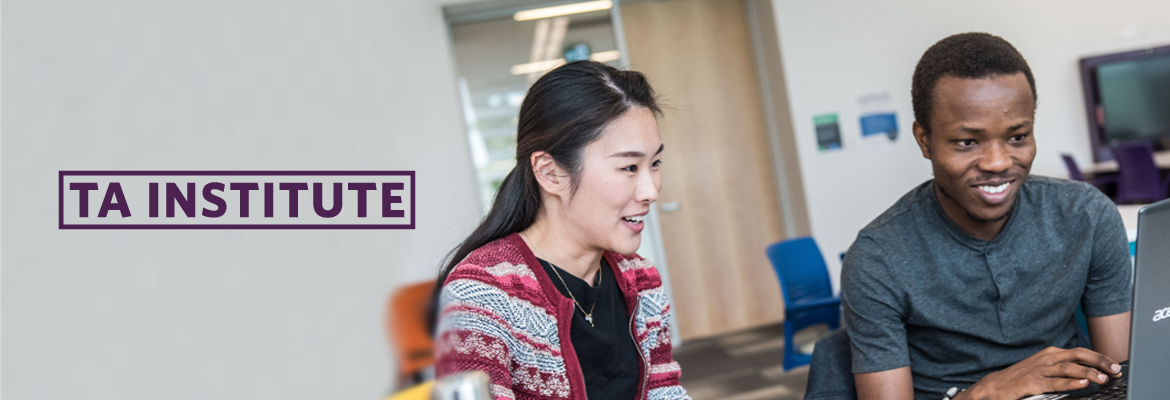For Teaching Assistants (TAs) and instructors, the events of 2020 have, among other things, highlighted the role of TAs as essential elements of a course teaching team. TAs were called upon in new and unprecedented ways to support courses in the rapid move to online teaching. In April 2020, to help support TAs in those new and expanded responsibilities, the CTLT shifted the long-running TA institute’s focus. The 2021 TA Institute, which took place January 11-15, was a culmination of the rapid learning around best practices for being a TA online, learned throughout the year in 2020 and weaved in with the fundamentals of pedagogy that has characterized the institutes in the past. This link represents a shift from surviving to thriving in being a TA. The 2021 TA Institute had close to 700 registrants and offered 13 teaching development sessions under six themes: Teaching for Inclusion and Accessibility; Implementing Impactful Teaching Practices; Designing for Impactful Teaching; Centering Student and TA Wellness; Professional (Interpersonal Skills); and Teaching with Technology. These themes reflected the needs expressed by TAs in an assessment survey done with UBC TAs in the Winter of 2020. Below is a snapshot of how these themes aimed to address some of the needs expressed by TAs during the past academic year:
A long-standing theme in the TA Institute and other CTLT programming has been of using accessible and inclusive teaching practices to meet diverse learners’ needs and incorporating them are fundamental in creating a holistic learning experience. Both the rapid shift to online instruction and the expanding awareness of how social issues are connected to teaching have generated additional energy and urgency for TAs to learn new ways to support their learners. Participants who completed workshops under the “Teaching for Inclusion and Accessibility” theme learned the importance of motivation in student learning and identified online instruction areas that preclude accessibility and inclusivity. Participants who attended sessions under this theme walked away with tangible steps for creating a respectful online learning environment. Some of these steps included adapting online teaching tools to meet broader needs and frameworks for anti-racism intervention and prevention and reflecting on strategies to address some challenges that may arise during in-person and online discussions about Indigenous issues with care and responsibility.

Another key theme in the 2021 TA Institute was “Implementing Impactful Teaching Practices.” Completing this theme supported TAs in deepening their understanding of what makes teaching practices impactful in synchronous and asynchronous online classes. By delving into a wide variety of teaching tools and techniques introduced in the sessions under this theme, TAs developed teaching skills and practices that contributed to better learning experiences for their students. Such skills included considering motivation as a learning tool when providing feedback to students, developing strategies for offering constructive feedback, recognizing the importance of identity in student learning, and disrupting harmful dynamics to create better learning experiences.
From surviving to thriving in online teaching
Almost a year into the COVID-19 situation, we have now adapted to a prolonged period of online instruction. Instructional goals have shifted from emergency teaching to implementing effective, high-quality teaching strategies. In workshops under the “Implementing Impactful Teaching Practices” and “Designing for Impactful Teaching” themes, participants were tasked with looking for the unique advantages and possibilities of online instruction and learned how to use online tools for maximum benefit. As part of this journey, not only did participants walk away with a toolbox of effective and creative online teaching tools and lesson design frameworks, but they also considered the opportunities for and barriers to learner motivation in online learning and how to plan for an engaging learning process.
TAs have also had to manage the additional incredible mental and emotional weight that comes with being a graduate student while providing instructional support to faculty and undergraduates during the unprecedented global and social crises. The purpose of the workshops within the “Centering Student and TA Wellness” theme was to provide tools to TAs to manage their mental health and support their students’ wellbeing, all while performing their required TA duties. Participants in these workshops developed strategies to address these difficult challenges in their TA work. Further, participants came away with strategies to help them improve their disrupted online workflow and set personal and professional boundaries with students and instructors in an online environment where professionalism blurs.
Addressing the new challenges and opportunities around communication that have emerged for TAs was another objective of the 2021 TA Institute. Workshops offered under the theme of “Professional (Interpersonal) Skills” aimed to help TAs hone their interpersonal skills in an online space and identify best practices for navigating online communication and professional relationships between TAs, instructors and students. Examples included developing strategies for offering constructive feedback in an online space, as well as methods to mitigate distractions, prioritize tasks, and set goals.

Highlighting the importance of technology in teaching
Creating engaging and meaningful learning experiences with effective choice and technology has also become a fundamental part of teaching during the COVID-19 outbreak. From communication with students to lesson delivery, it has become essential for TAs to be aware of the challenges and benefits that technology can create for both learners (students and TAs) and educators (TAs and faculty). Sessions in the theme of “Teaching with Technology” helped TAs develop skills for assessing the effectiveness of learning technologies and developing pedagogical strategies for teaching with technology. These strategies included exploring the dynamics of asynchronous instructor-to-student and student-to-student interaction, the role of these interactions in supporting learning, as well as discussing solutions to challenges that arise while leading discussions online.
Many TAs who attended the TA Institute expressed their appreciation for the suggestions, tools, strategies, techniques, and concepts that they learned and the opportunity to put those into practice. Others were happy to have found solutions to challenges they have been experiencing. It has been rewarding to support TAs across the university who care about teaching to find new ways to contribute to teaching excellence at UBC, even during these unprecedented and challenging times.

